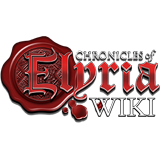Introduction[ | ]
The peoples of Elyria have developed various languages throughout Elyria's long history. As cultures develop, merge and dissolve, so do languages.
Languages of Elyria[ | ]
There are nine languages known throughout the starting continent(s) in Elyria.[1] The list below is given in order of prevalence.
- Neran - The language that is historically spoken by the Neran and has, through their prolific trading, become the language-of-choice for business and mercantilism beyond the borders of predominantly Neran settlements. This language's alphabet and phonology is effectively identical to English.
- Croçais - The language of diplomacy, Croçais originated with the To'resk tribe but, like Neran, has come to be known far and wide. Sometimes called the "Neran of the South", it favors a softer, more flowing phonology. This language includes the characters ç and î, but not p.
- Denhørt - Spoken predominantly in the frosty mountains of the north, it is usually dropped in favor of Neran when its speakers come to the lowlands because the subtle distinctions between many sounds are seen as overly complicated to non-native speakers. It includes the letters ä, ö, ü, ø, and ß.
- Pyqsi - Coming from the same root language as Neran, this approachable and mellifluous language has evolved to be very contextual, which is ultimately why it didn't become the language of choice for commerce. It can be heard among the treetops of the great forests and in the great academies founded generations ago by Kypiq masters: the Kinothian and the Arkyn. It also includes the ß character, but not c or x as in Neran.
- Lazu - A peculiar language found only in the freshwater swamps, this language is spoken predominantly by the Dras. Though speakers are more than happy to teach outsiders, it suffers from a similar fate as Denhørt and is dropped in favor of more dominant tongues in the southern regions. The Lazu alphabet includes ç, ó, and ÿ, but the letters b, c, f, and q do not feature in it.
- Næroth - Gruff and grating, the traditional tongue of the Hrothi rarely makes it out of the mountain. Scholars hoping to study from illuminated manuscripts in the Great Libraries often learn to read, but not speak, the highly-embellished language. In addition to the letters of the Neran alphabet, it also includes the characters æ, à, è, ì, ò, and ù (which have a distinct pronunciation from their un-accented counterparts). The letter x has been omitted.
- Jenu - Stubbornly against learning other languages, you'll encounter Jenu in the Janoan rainforests. Those wishing to negotiate or trade with the Janoa may pick up enough of the staccato vocabulary to get by, but most will seek the services of a translator, usually Drasean. The letters á, é, í, ó, and ú all indicate a stress when speaking but have the same vowel sound as their unaccented counterpart. The following letters don't feature in Jenu: c, f, q, or x.
- Isshek - This language, like the Waerd, is mysterious and misunderstood. Considered to be hereditary, it's not taught to others. Beyond the Waerdic settlements of the semi-arid desert, it is rarely heard and, when it is, its susurrus vocalization tends to make others uncomfortable. The alphabet has no extra characters, but also further omits f, p, q, and x.
- Forest Cant - Spoken only by Kypiq and never taught to outsiders, this special form of communication mimics the sounds of the forest and travels well under the forest canopy. There is no written alphabet.
Ancient Languages[ | ]
In addition to the above, actively used, languages, there is also the possibility of ancient, now unused, languages that may be discovered in-game.[2]
Linguistics[ | ]
Learning a language will mirror real-life language acquisition and will depend on time spent and quality of resources.
Fluency[ | ]
The language barrier will be similar to that in real life, which is why there will be different phases of language learning. You don't actually need to be fluent to get by in another language. The amount of words needed is surprisingly low. Most players will probably never be fluent in two or more languages, unless they live in an area that makes it important or have a profession or interest in translation..[2]
Trivia[ | ]
- Due to the fact that in-game languages are entirely different from real life languages, translating the game to non-English languages will not have any effect or require any alteration to the in-game languages.
References[ | ]
| |||||
